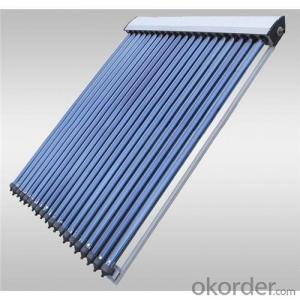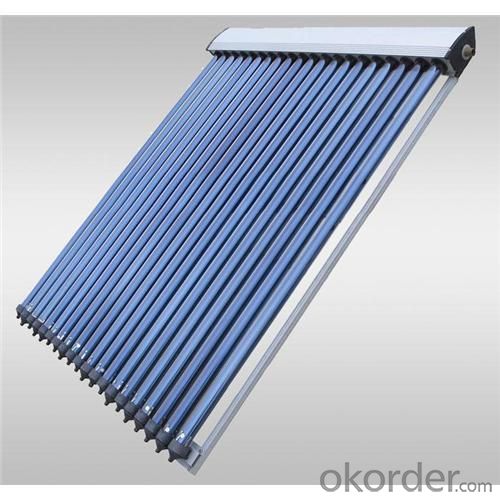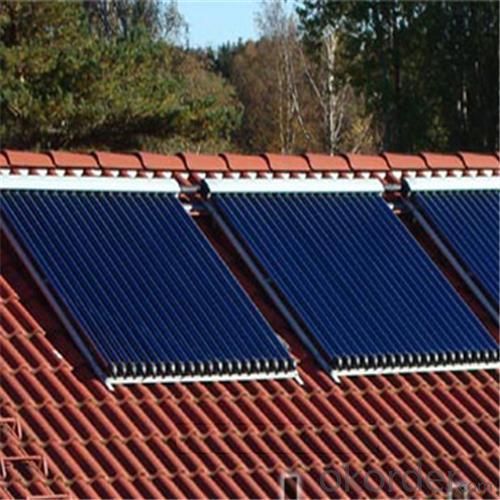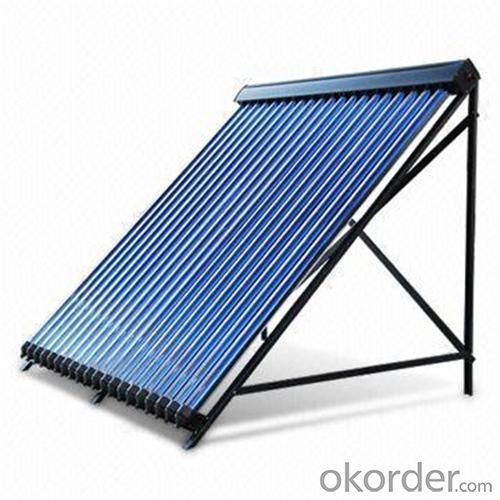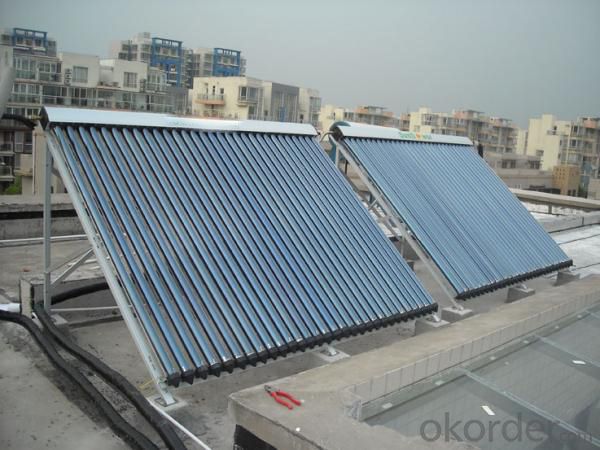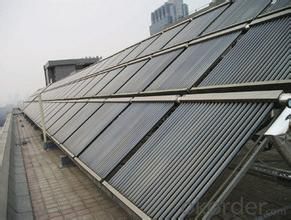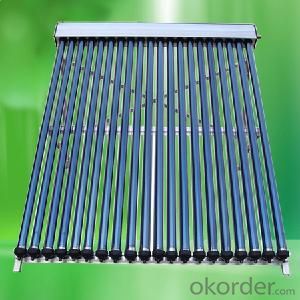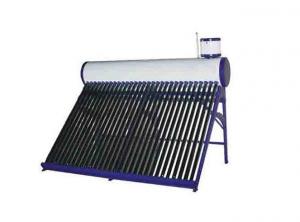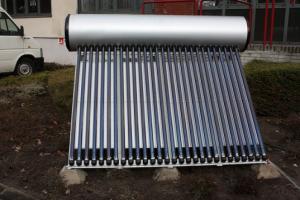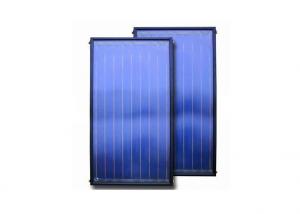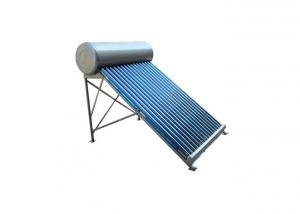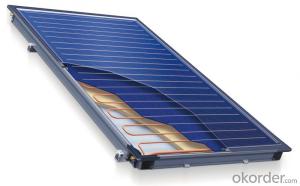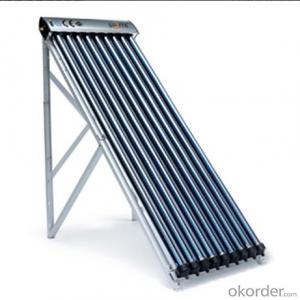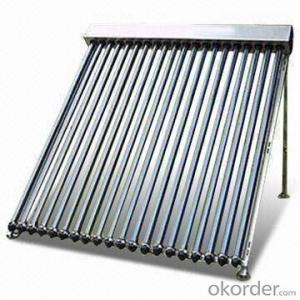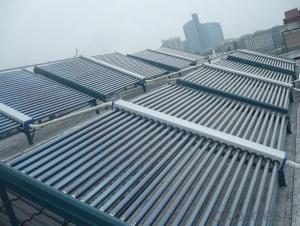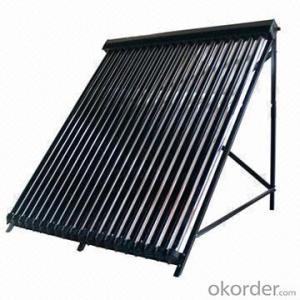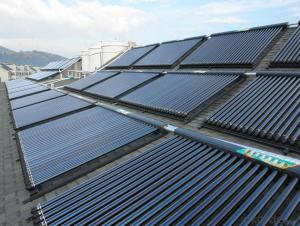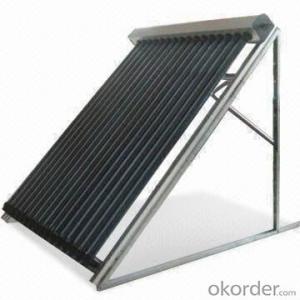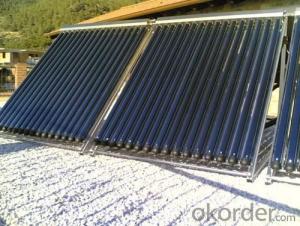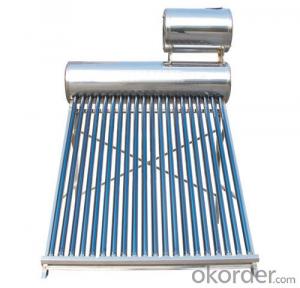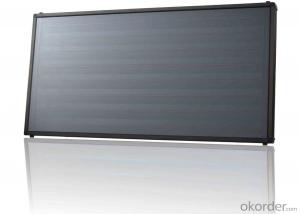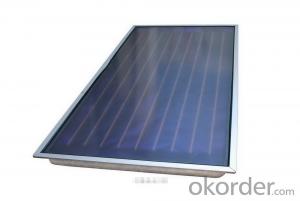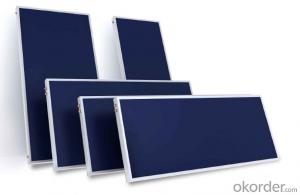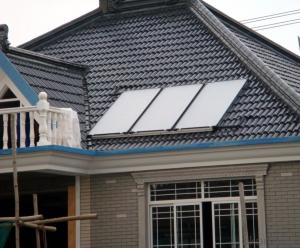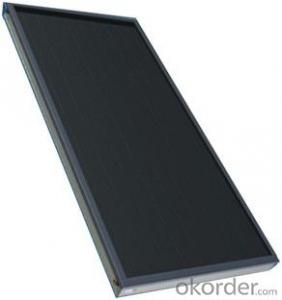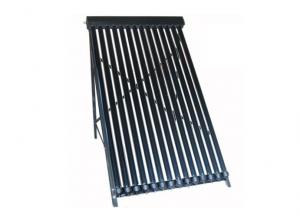Passive Solar Collectors - 20 Tubes Solar Pipes Solar Collectors EN12975
- Loading Port:
- China main port
- Payment Terms:
- TT OR LC
- Min Order Qty:
- 5 set
- Supply Capability:
- 10000 set/month
OKorder Service Pledge
OKorder Financial Service
You Might Also Like
Specification
manifold (inner) | red copper |
manifold (exterior) | aluminum alloy |
glass tube dimensions | 58mm * 1800mm |
daily efficiency | ≥55% |
heat preservation | 72 hours |
hail resistance | 25mm |
max pressure | 7 bar |
coating of vacuum tube | ALN/AIN-SS/CU |
heat pipe | anti-freezing > -35 degree |
certificate | Solar Keymark, EN12975,SRCC |
Serious Product
Models | L*W*H mm | Vacuum tube | Power output | Efficiency | Header mm | Frame | container loading 20FT/40HQ sets | Gross Weight kg |
SHC-8 | 1917*910*133 | 58*1800*8pcs | 939W | 0.668 | Φ35/1.0 | AL alloy | 185/445 | 27 |
SHC-10 | 1917*1130*133 | 58*1800*10pcs | 1189W | 159/385 | 33 | |||
SHC-12 | 1917*1350*133 | 58*1800*12pcs | 1440W | 149/358 | 40 | |||
SHC-15 | 1917*1680*133 | 58*1800*15pcs | 1815W | 120/290 | 49 | |||
SHC-18 | 1917*2010*133 | 58*1800*18pcs | 2191W | 100/242 | 59 | |||
SHC-20 | 1917*2230*133 | 58*1800*20pcs | 2442W | 87/210 | 66 | |||
SHC-22 | 1917*2450*133 | 58*1800*22pcs | 2692W | 83/202 | 72 | |||
SHC-24 | 1917*2670*133 | 58*1800*24pcs | 2943W | 77/188 | 79 |
Packaging & Delivery
Packaging Details: | Exporting Carton with big foaming protection |
Delivery Detail: | In 10-15 days |
Loading Quantity
Model | Tube | Tube Q.T.Y | Loading Q.T.Y/40HQ |
GSC15 | 58*1800mm | 15pcs | 315sets |
GSC18 | 58*1800mm | 18pcs | 265sets |
GSC20 | 58*1800mm | 20pcs | 248sets |
GSC22 | 58*1800mm | 22pcs | 225sets |
GSC25 | 58*1800mm | 25pcs | 200sets |
GSC30 | 58*1800mm | 30pcs | 168sets |
Details of solar collector:
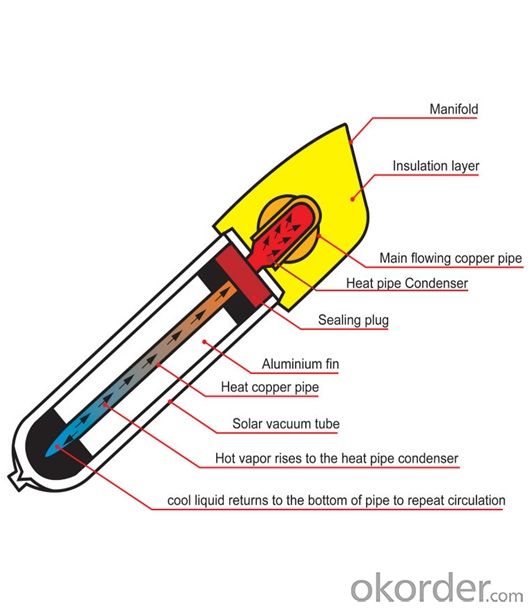
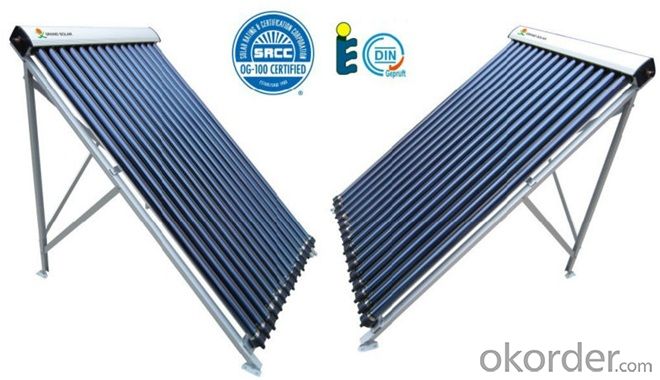
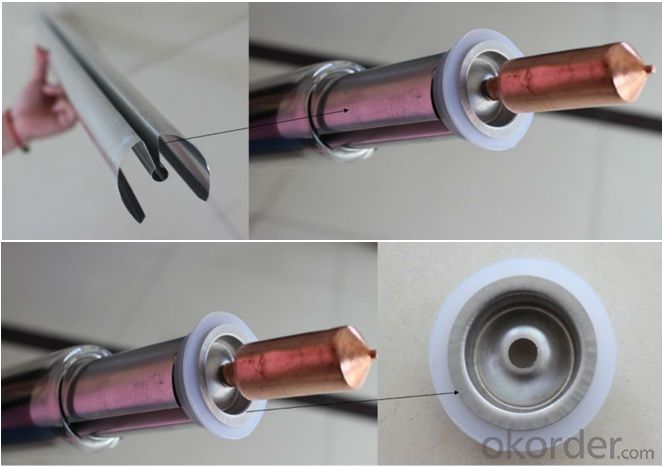
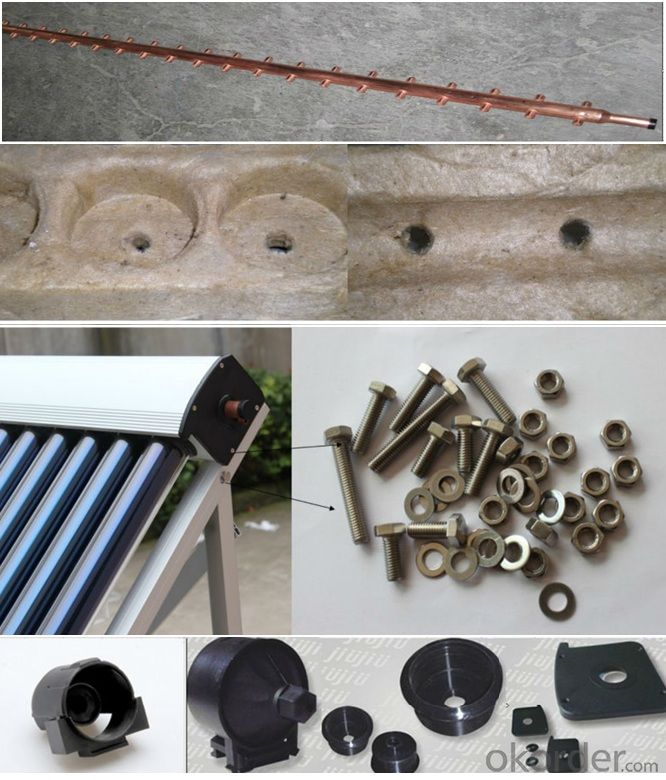
- Q: Are solar collectors suitable for residential communities?
- Solar collectors are an excellent choice for residential communities, providing numerous advantages that make them the perfect energy solution for homeowners in residential areas. To begin with, solar collectors effectively reduce electricity bills. By harnessing the energy of the sun, homeowners can generate their own electricity, reducing their reliance on the traditional power grid. This not only saves money but also helps counter the impact of escalating energy costs. Moreover, solar collectors are environmentally conscious. They produce clean and renewable energy, effectively reducing greenhouse gas emissions and aiding in the fight against climate change. By installing solar collectors in residential communities, we can actively contribute to a greener and more sustainable future. Furthermore, solar collectors require minimal maintenance. Once installed, they operate silently and emit zero harmful substances. This makes them incredibly convenient for homeowners, as they eliminate concerns about ongoing maintenance or additional expenses. In addition, solar collectors enhance the value of residential properties. Research has shown that homes equipped with solar panels or collectors have higher resale values compared to those without. As more individuals become environmentally aware, the demand for solar-powered homes is growing, making them a wise investment for residential communities. Additionally, solar collectors provide energy independence. Homeowners can generate their own power, reducing their reliance on the power grid and ensuring a reliable source of electricity. This is especially advantageous during power outages or emergencies, as solar panels can continue to produce electricity as long as the sun is shining. In conclusion, solar collectors are an excellent choice for residential communities. They offer substantial financial savings, environmental benefits, low maintenance requirements, increased property value, and energy independence. By embracing solar energy, residential communities can actively contribute to a more sustainable future while enjoying the numerous advantages that solar collectors provide.
- Q: Can solar collectors be used in combination with water desalination systems?
- Water desalination systems can be combined with solar collectors for an effective solution. By harnessing solar energy, desalination systems can convert saltwater into freshwater by eliminating salt and impurities. Solar collectors, such as solar panels or solar thermal collectors, provide the necessary power for the desalination process. This combination offers various benefits. Firstly, solar energy is a clean and renewable power source, making the desalination process more environmentally friendly. Secondly, integrating solar collectors into existing desalination systems reduces reliance on fossil fuels and cuts operational costs. Moreover, solar-powered desalination systems are particularly advantageous in remote or off-grid areas with limited access to electricity. In conclusion, the combination of solar collectors and water desalination systems provides a sustainable and efficient solution to the increasing global water scarcity problem.
- Q: Can solar collectors be used for cooling purposes?
- Yes, solar collectors can be used for cooling purposes. Solar-powered absorption chillers and desiccant cooling systems are examples of technologies that use solar collectors to provide cooling by harnessing the sun's energy. These systems can be used for air conditioning or refrigeration in buildings, reducing the reliance on conventional energy sources and helping to reduce carbon emissions.
- Q: Can solar collectors be used for heating bike paths?
- Yes, solar collectors can be used for heating bike paths. By installing solar collectors along the bike path, they can absorb solar energy and convert it into heat, which can then be used to warm up the path's surface. This can help prevent ice formation and improve safety during colder seasons.
- Q: Can solar collectors be used in air conditioning?
- Yes, solar collectors can be used in air conditioning systems. Solar collectors, such as solar thermal panels or evacuated tube collectors, can be used to harness the energy from the sun and convert it into heat. This heat can then be used to power absorption chillers or heat pumps, which are commonly used in air conditioning systems. The heat generated by the solar collectors can be used to drive the cooling process, reducing the reliance on traditional energy sources and making the air conditioning system more sustainable and environmentally friendly. Additionally, solar collectors can also be used to provide pre-heating of the ventilation air, reducing the energy demand of the entire air conditioning system.
- Q: Can solar collectors be used for generating electricity on spacecraft?
- Yes, solar collectors can be used for generating electricity on spacecraft. In fact, solar panels are a primary source of power for most spacecraft as they convert sunlight into electricity through photovoltaic cells. This sustainable and efficient method allows spacecraft to operate in space where traditional power sources like fossil fuels are not viable.
- Q: Can solar collectors be used in cement factories?
- Cement factories can indeed incorporate solar collectors. These collectors, whether solar thermal systems or photovoltaic panels, have the capability to generate electricity or heat in the cement production process. To generate electricity, cement factories can install photovoltaic panels on their roofs or in open spaces. These panels efficiently convert sunlight into electricity, which can then power various aspects of the factory, such as lighting, machinery, or other electrical equipment. By integrating solar collectors for electricity generation, cement factories can greatly reduce their reliance on traditional fossil fuel-based power sources, resulting in decreased greenhouse gas emissions and a more sustainable production process. Solar thermal systems can also be utilized in cement factories to provide heat for different stages of production. For instance, solar thermal collectors can generate the high temperatures necessary for clinker production or preheat raw materials prior to entering the kiln. By incorporating solar collectors for heat generation, cement factories can decrease their dependence on fossil fuel-based heating systems, leading to reduced energy expenses and carbon emissions. The implementation of solar collectors in cement factories offers multiple advantages, including diminished environmental impact, lower energy costs, and enhanced energy independence. However, it is crucial to consider the individual requirements and characteristics of each cement factory in order to determine the most suitable type and size of solar collector system to be installed.
- Q: Can solar collectors be used in areas with limited access to distribution networks?
- Yes, solar collectors can be used in areas with limited access to distribution networks. Solar energy can be harnessed and used directly on-site, reducing the reliance on distribution networks for electricity supply. This makes solar collectors a viable and sustainable option for off-grid or remote locations with limited infrastructure.
- Q: How do flat plate solar collectors work?
- Flat plate solar collectors work by capturing the sun's heat energy through a dark-colored plate, typically made of metal, which absorbs the sunlight. This absorbed heat is then transferred to fluid circulating through pipes or channels within the collector. The fluid, usually water or an antifreeze solution, then carries the heat to a storage tank or directly to a target application like space heating or hot water. The collector is designed with a transparent cover, usually glass or plastic, which allows sunlight to pass through but traps the heat inside, creating a greenhouse effect. This process allows flat plate solar collectors to efficiently convert solar energy into usable heat for various residential, commercial, and industrial purposes.
- Q: Can solar collectors be used for heating cathedrals?
- Yes, solar collectors can be used for heating cathedrals. Solar thermal systems can be installed on the roof or around the cathedral to collect sunlight and convert it into heat energy. This heat can then be used to warm the interior of the cathedral, providing a sustainable and environmentally friendly heating solution.
Send your message to us
Passive Solar Collectors - 20 Tubes Solar Pipes Solar Collectors EN12975
- Loading Port:
- China main port
- Payment Terms:
- TT OR LC
- Min Order Qty:
- 5 set
- Supply Capability:
- 10000 set/month
OKorder Service Pledge
OKorder Financial Service
Similar products
Hot products
Hot Searches
Related keywords
